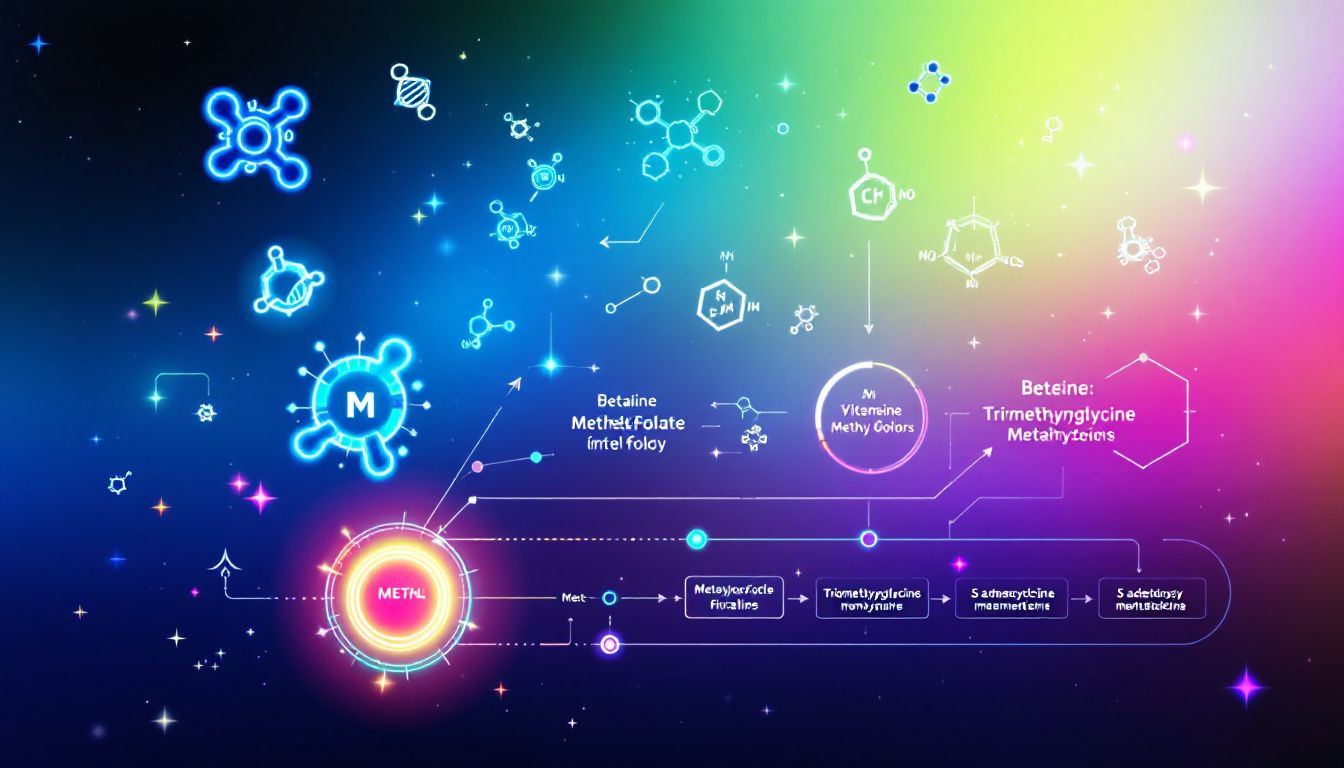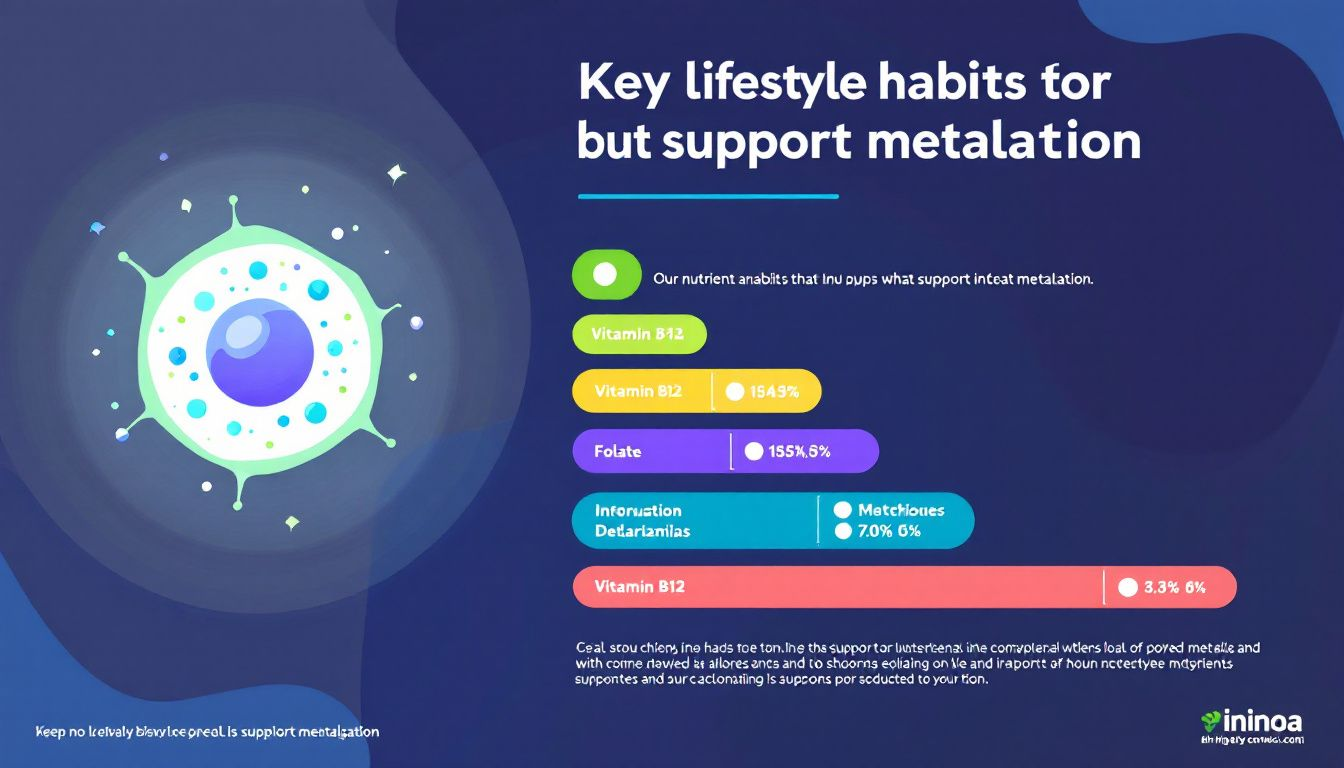Methylated vitamins are pre-activated forms of B vitamins essential for optimal health. They are readily usable by the body, which is particularly crucial for people with genetic mutations like MTHFR that impair normal vitamin conversion. This article will explain what methylated vitamins are, their health benefits, and why they might be important for you.
Key Takeaways
Methylated vitamins, like methylcobalamin and methylfolate, provide active forms of B vitamins that are immediately usable by the body, benefiting those with genetic variations affecting vitamin conversion.
Methylation is essential for processes such as DNA repair and gene expression, and it is significantly influenced by dietary factors and nutrient intake, particularly from methylated forms of folate and B12.
Selecting high-quality methylated multivitamins and incorporating natural food sources can enhance nutrient absorption and support overall health, particularly for individuals with MTHFR gene mutations.
Understanding Methylated Vitamins

Methylated vitamins are a special category of B vitamins that come in their active, pre-methylated forms, such as methylcobalamin and methylfolate. These forms are immediately usable by the body, eliminating the need for conversion processes that can be inefficient, especially in individuals with certain genetic variations like MTHFR. The term “methylated” refers to the presence of a methyl group, a small molecule that plays a vital role in the body’s biochemical processes.
The process of methylation involves adding a methyl group to a molecule, enabling the conversion of vitamins into their active forms. This conversion is crucial for various bodily functions, including DNA repair, energy production, and detoxification.
Non-methylated vitamins, like traditional folic acid, require enzymatic reactions to become active. In contrast, methylated vitamins bypass this need, providing direct support to the body’s methylation pathways. This is particularly beneficial for those with sluggish folate pathways or MTHFR gene variations, who may struggle to convert non-methylated vitamins into their usable forms.
The Role of Methylation in the Body

Methylation is a key biochemical process. It involves the transfer of a methyl group from one substance to another. This process is essential for numerous bodily functions, including DNA synthesis and repair, gene expression, and detoxification. Proper methylation is crucial for maintaining overall health and preventing various chronic conditions. The Southern European Atlantic diet, which emphasizes seasonal and local foods, can promote healthy methylation through nutrient diversity.
Methylation’s significance extends beyond basic biochemical functions; it influences epigenetics, which refers to changes in gene function without altering the genetic code itself. This means that methylation can turn genes “on” or “off,” affecting how our bodies respond to various environmental factors.
Two critical aspects of methylation are DNA methylation and one-carbon metabolism, both of which play pivotal roles in maintaining health and well-being.
DNA Methylation
DNA methylation is a process where a methyl group is added to DNA, influencing gene expression by turning genes “on” or “off”. This process is vital for regulating genetic activity and maintaining proper cellular function. Methylation helps dictate when genes should be read and expressed, impacting everything from growth and development to disease prevention. For instance, genes like MTHFR and SHMT are involved in converting folinic acid to methylfolate, a crucial step in the methylation cycle.
Epigenetics, the study of changes in gene function that do not involve alterations to the DNA sequence, is heavily influenced by DNA methylation. This field of study has shown that environmental factors, such as diet and lifestyle, can significantly impact gene expression through methylation.
Proper methylation is essential for preventing diseases and maintaining overall health, making it a critical area of focus for nutritional science and health optimization.
One Carbon Metabolism
One-carbon metabolism is a network of biochemical pathways that integrate various nutrients to support DNA methylation and other critical functions. This metabolic process relies on active forms of nutrients, including folate and B vitamins (B6 and B12), to function optimally. These nutrients act as methyl donors, providing the necessary methyl groups for methylation processes.
The efficient operation of one-carbon metabolism is crucial for maintaining proper methylation and overall health. By ensuring an adequate intake of methylated vitamins, such as L-methylfolate and methylcobalamin, you can support these metabolic pathways and promote better health outcomes.
This underlines the importance of incorporating key methylated nutrients into your diet to facilitate effective methylation and support various bodily functions.
Key Methylated Nutrients
Key methylated nutrients, such as L-Methylfolate and Active B12 (Methylcobalamin), play crucial roles in supporting methylation and overall health. These nutrients are essential for maintaining proper methylation function and ensuring the body can efficiently utilize vitamins. L-Methylfolate is the active form of folate that assists with various bodily functions, especially in methylation.
Active B12, or Methylcobalamin, is another critical nutrient that supports methylation and is essential for maintaining a healthy immune system.
Methylated nutrients are present in various products. These include multivitamins, prenatal vitamins, B complexes, and standalone methylation support items. Understanding the roles of these key nutrients can help you make informed decisions about your dietary and supplementation choices.
Methylfolate (L-Methylfolate)
L-Methylfolate is the active form of folate that is crucial for converting dietary folate into its usable form, making it particularly important for individuals with MTHFR gene variations. Methylated nutrients like L-Methylfolate act as methyl donors, replenishing folate and supporting overall methylation pathways. The conversion of folinic acid to methylfolate requires cofactors such as riboflavin and magnesium.
Proper functioning of the MTHFR gene depends on the presence of riboflavin (B2) alongside folate. Fortified foods and supplements can provide essential vitamins like B12 and folate, which are particularly beneficial for individuals with dietary restrictions or genetic variations.
Foods enriched with folic acid significantly contribute to daily folate intake and help reduce deficiencies, especially for those with MTHFR mutations.
Methylcobalamin (Active B12)
Methylcobalamin, also known as Active B12, plays a significant role in supporting methylation and is particularly important for metabolic functions and cognitive health. This form of vitamin B12 is readily usable by the body, unlike other forms that require conversion. Methylcobalamin supports the healthy functioning of the nervous system and helps maintain adequate homocysteine levels, which are crucial for cardiovascular health.
Incorporating Methylcobalamin into your diet or supplementation routine can help ensure you receive the full benefits of vitamin B12, particularly if you have genetic variations that affect methylation. This active form of B12 is essential for maintaining overall health and well-being, supporting everything from energy production to immune function.
Benefits of Methylated Vitamins

Methylated vitamins offer numerous benefits, making them a valuable addition to your health regimen. These vitamins provide pre-methylated forms of B vitamins, which are necessary for the body to utilize them effectively. By improving biochemical processes, methylated B vitamins support functions like gene expression, DNA repair, and energy production. Selecting a methylated multivitamin can significantly enhance nutrient absorption, especially for individuals with genetic variations affecting vitamin processing.
Methylated vitamins may be particularly beneficial for individuals with MTHFR gene mutations, which hinder folate metabolism. By providing active forms of vitamins, these supplements can help improve overall health and well-being. It’s important to consider the bioavailability of ingredients in your multivitamin to ensure effective absorption and utilization by the body.
Enhanced Absorption and Utilization
Methylated vitamins offer enhanced absorption compared to other vitamin forms. These pre-methylated forms are more readily absorbed and utilized by the body, ensuring you receive the full benefits of the nutrients. The absorption of folic acid, for instance, is enhanced when taken with food, making it advisable to consume methylated vitamin supplements during meals.
Enhanced absorption and utilization of methylated vitamins contribute to improved overall health. These vitamins support various bodily functions, including DNA repair, energy production, and immune system maintenance. By choosing methylated vitamins, you can ensure optimal absorption and maximize the health benefits of your supplements.
Support for Individuals with MTHFR Gene Variants
Individuals with MTHFR gene mutations have an impaired ability to convert folate, making methylated forms essential for their health. Methylated vitamin supplements are often recommended for individuals with MTHFR gene variants as they provide enhanced bioavailability. Proper dietary management and supplementation can significantly support the health of those with MTHFR variants.
MTHFR gene variations can lead to difficulties in folate metabolism, indicating a specific need for its methylated forms. Active forms of vitamins are crucial for individuals with genetic variations that affect methylation processes. Supplementing with active B12, for instance, can help improve homocysteine levels, which are often elevated in individuals with MTHFR gene mutations. Proper supplementation can help reduce the risk of health issues associated with these genetic variations.
Potential Side Effects and Considerations
While methylated vitamins offer numerous benefits, some individuals may experience side effects. Common side effects include agitation, digestive issues, nervousness, and rapid heartbeat. It is vital to monitor for any adverse effects and discuss them with a healthcare professional when starting methylated vitamins. High doses of folate can potentially obscure a vitamin B12 deficiency, which may lead to nerve damage.
Individuals using methotrexate or certain anti-seizure medications should consult a healthcare provider before taking methylated supplements. It is also recommended to seek medical advice if you are pregnant or breastfeeding before starting methylation support. Consulting a healthcare professional ensures that methylated vitamins are appropriate for your specific health needs and helps avoid potential risks.
How to Choose the Right Methylated Multivitamin
Choosing the right methylated multivitamin is crucial for supporting your health and well-being. It is essential to verify that your multivitamin contains bioactive forms of key nutrients like methylfolate and methylcobalamin. These active forms are more readily absorbed and utilized by the body, ensuring you receive the full benefits of the vitamins.
When selecting a multivitamin, consider factors such as the bioavailability of ingredients and the presence of common allergens. By choosing a high-quality methylated multivitamin, you can support proper methylation and enhance your overall health.
Checking Labels for Active Forms
When reviewing supplement labels, it is important to look for active forms of B vitamins, such as L-methylfolate and methylcobalamin. These forms are immediately usable by the body, unlike other forms that require conversion. By ensuring your multivitamin contains these active forms, you can support proper methylation and improve nutrient absorption.
Look for specific active forms of nutrients like L-Methylfolate and Methylcobalamin on the supplement label to ensure proper methylation support. Choosing supplements with these bioactive ingredients can significantly impact your health and well-being.
Avoiding Common Allergens
The common allergens to avoid in methylated vitamins include gluten, dairy, and soy. Many methylated vitamins are formulated to be free from these allergens, ensuring safe supplementation for individuals with sensitivities. Careful selection of methylated vitamins helps ensure they are devoid of allergens, thereby supporting overall health without triggering allergic reactions.
Choosing methylated vitamins that are free from common allergens is crucial for ensuring safe and effective supplementation. By selecting allergen-free supplements, you can support your health without compromising your immune system.
Incorporating Methylated Vitamins into Your Diet

Incorporating methylated vitamins into your diet can be done through both food sources and supplements. Natural sources of methylated folate include dark leafy greens, legumes, and certain animal products like eggs and meat. These foods provide essential nutrients like folate, choline, and methionine, which support methylation and overall health. Many fortified foods also contain methylated forms of vitamins, making it easier to meet your nutritional needs.
For those with specific genetic variations, such as MTHFR mutations, it is crucial to choose supplements that contain bioactive forms like L-Methylfolate and Methylcobalamin. Following recommended dosage guidelines and consulting with a healthcare professional ensures you receive the maximum benefits while avoiding potential side effects.
Monitoring your body’s response to these supplements can help in adjusting dosages for optimal health outcomes.
Dietary Intake and Fortified Foods
Natural sources of methylated folate, such as dark leafy greens and legumes, are beneficial for those with MTHFR mutations. Including these foods in your diet can help ensure you receive adequate methyl donors to support proper methylation. Leafy greens, legumes, and eggs are excellent sources of nutrients like folate, choline, and methionine, which support methylation.
Fortified cereals and other foods are also important for individuals needing adequate methyl donors. Incorporating natural methyl donors into your diet is crucial for supporting health, particularly for those with MTHFR mutations. These foods provide comprehensive nutritional support, ensuring you receive essential nutrients for optimal health.
Supplementation Guidelines
The recommended daily dosage for methylation support is typically 3 capsules daily. Consistency in timing is key; methylated vitamins can be taken at any time of day – morning, afternoon, or evening. Understanding serving size and dosage is crucial for maximizing the benefits of methylated vitamin supplements.
Consulting with a healthcare professional is advisable to ensure the dietary supplements regimen aligns with your individual health needs. This ensures you receive comprehensive nutritional support and avoid potential side effects.
Following these guidelines helps you effectively incorporate methylated vitamins into your routine, contributing to overall health and well-being.
Lifestyle Habits to Support Methylation

Adopting healthy lifestyle habits can significantly support methylation processes. Stress management techniques, such as mindfulness and relaxation exercises, can enhance overall health and promote proper methylation. Maintaining a stress-free environment positively impacts mental health and methylation outcomes.
Engaging in regular physical activity is essential for maintaining a healthy lifestyle, which influences methylation processes. A balanced diet rich in fruits, vegetables, whole grains, and healthy fats provides the necessary nutrients for effective methylation.
Methylation support products, including combinations of essential vitamins like B2, B6, and B12, can also contribute to effective methylation processes. These habits, combined with proper supplementation, can help optimize your health and well-being.
Summary
Methylated vitamins play a crucial role in supporting various biochemical processes in the body, particularly methylation. By providing pre-methylated forms of essential nutrients, these vitamins enhance absorption and utilization, making them especially beneficial for individuals with genetic variations like MTHFR mutations. Key methylated nutrients, such as L-Methylfolate and Methylcobalamin, support vital functions, including DNA repair, energy production, and immune system maintenance.
Incorporating methylated vitamins into your diet through natural food sources and supplements can significantly improve your overall health. By choosing the right methylated multivitamin, checking labels for active forms, and avoiding common allergens, you can ensure optimal nutrient intake. Adopting healthy lifestyle habits further supports methylation, contributing to better health outcomes. Embrace the power of methylated vitamins and take proactive steps towards enhancing your well-being.
Frequently Asked Questions
What are methylated vitamins?
Methylated vitamins, like methylcobalamin and methylfolate, are B vitamins in their active forms that enhance methylation processes and promote overall health. Prioritizing these forms can support your body’s vital functions more effectively.
Why is DNA methylation important?
DNA methylation is essential for regulating gene expression and ensuring proper cellular function by determining which genes are activated or silenced.
How do methylated vitamins benefit individuals with MTHFR gene variants?
Methylated vitamins benefit individuals with MTHFR gene variants by providing active nutrient forms that enhance absorption and utilization, addressing the deficiencies caused by the mutation. This can lead to improved overall health and metabolic function.
What should I look for when choosing a methylated multivitamin?
When choosing a methylated multivitamin, prioritize active forms of B vitamins like L-Methylfolate and Methylcobalamin, while also avoiding common allergens such as gluten, dairy, and soy. This ensures better absorption and minimizes potential allergic reactions.
Can methylated vitamins cause side effects?
Yes, methylated vitamins can cause side effects such as agitation, anxiety, panic attacks, digestive issues, nervousness, and rapid heartbeat. It’s crucial to consult a healthcare professional before beginning supplementation.

